Key takeaways:
- Understanding web browser security and taking proactive measures, such as maximizing privacy settings and using HTTPS, is essential for protecting personal data online.
- Always verify the source of downloads, utilize user reviews, and look for security certifications to avoid malware and ensure safe applications.
- Regularly updating browsers, extensions, and antivirus software is crucial to defend against evolving threats and vulnerabilities.
- Using a password manager enhances security by generating complex passwords and enabling two-factor authentication, reducing risks associated with password reuse.
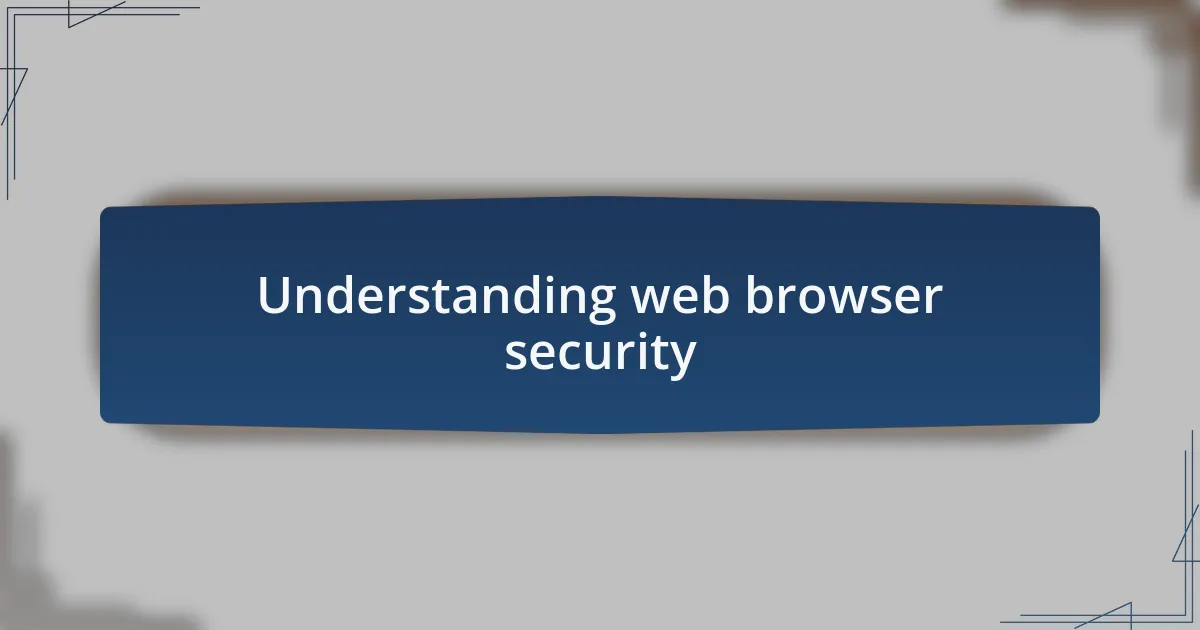
Understanding web browser security
When it comes to web browser security, I’ve often reflected on how easily we can fall into complacency. I remember a time when I clicked on a seemingly harmless link and suddenly found myself knee-deep in a malware nightmare. It was a pivotal moment that taught me the importance of understanding browser security measures, like HTTPS and built-in phishing protections, which now feel like my armor in the vast and often unpredictable online world.
Have you ever wondered how much information your browser collects? It’s both fascinating and a little unsettling. I was surprised to learn that while browsers enhance our experience through personalization, they also create vulnerabilities. This realization pushed me to regularly adjust my privacy settings, ensuring that I’m not just a passive consumer of web content, but an empowered user safeguarding my own data.
As I dive deeper into browser security, I find myself constantly updating my knowledge. For instance, learning about the significance of browser extensions really changed my approach to security. My experience has shown me that while some add-ons can bolster protection, others may compromise it, making it vital to choose wisely. It’s a balancing act, but with the right tools and knowledge, I feel much more confident navigating the online landscape.
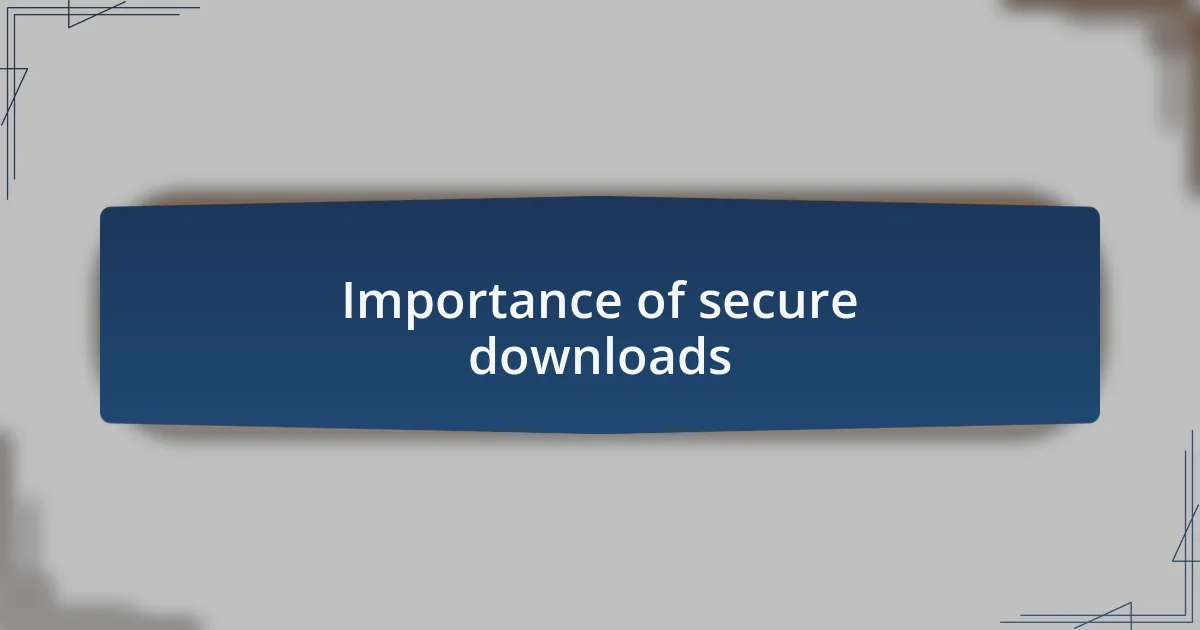
Importance of secure downloads
Secure downloads are crucial for ensuring the health of our devices and protecting our personal information. I still vividly recall the anxiety I felt when I accidentally downloaded software from an unverified source—my heart raced as the installation proceeded, unsure of what hidden threats I might have invited. That experience remains etched in my mind, driving my commitment to always verify the source of any file before hitting that download button.
Each time I choose to download an application or file, I ask myself, “Is this really safe?” This questioning habit stems from a close call that taught me the importance of not only checking for HTTPS but also looking for user reviews and reputability. It has become almost second nature for me to perform due diligence, knowing that while it may take extra time upfront, the peace of mind is invaluable.
I often wonder why many users overlook secure downloads, especially in a climate where cyber threats are rampant. The stakes are high—one simple download can unleash a world of trouble. For me, prioritizing secure downloads means actively protecting my digital identity and giving myself the confidence to navigate the online realm without fear.
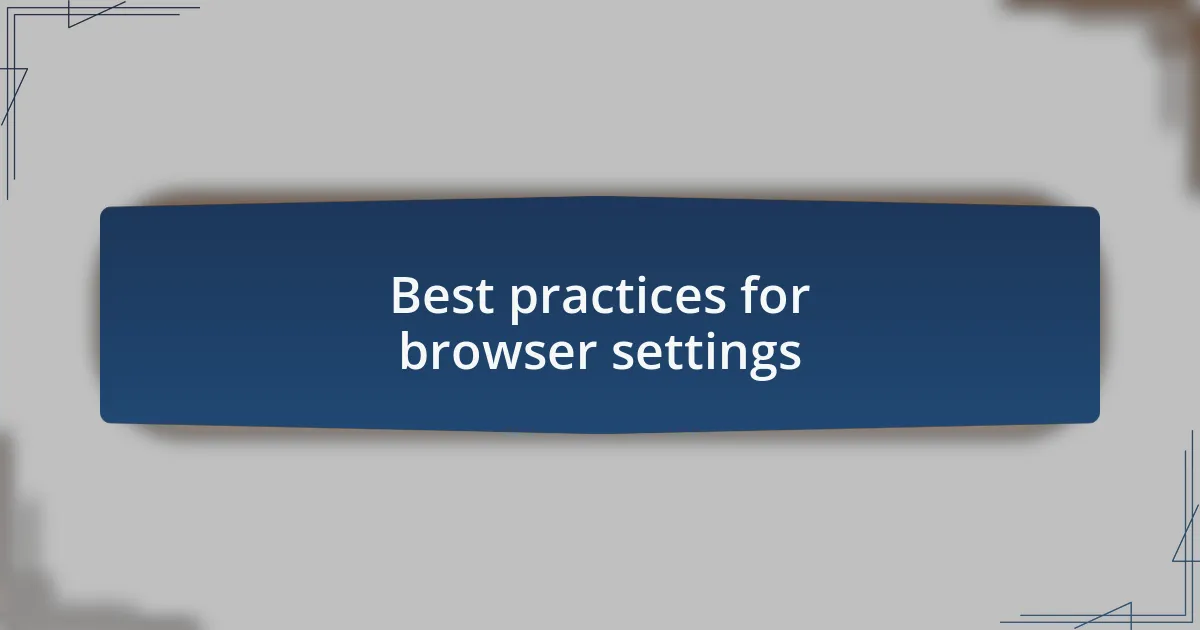
Best practices for browser settings
When it comes to browser settings, I always ensure that my privacy settings are maximized. For instance, I tweak the settings to block third-party cookies, which helps prevent advertisers from tracking my online behavior. Have you ever noticed how ads seem to follow you around the web? That little tweak not only reduces unwanted ads but also makes my browsing experience feel less invasive and more secure.
Another best practice I utilize is enabling the “Do Not Track” feature. It’s comforting to know that I can actively express my desire not to be tracked online, even if not all websites adhere to it. I remember a time when I was oblivious to online tracking, but now I feel empowered by just this small action. Isn’t it intriguing how a simple toggle in settings can elevate our control over personal information?
Finally, I recommend regularly updating both browsers and security software. Keeping these tools current is like having a sturdy lock on your door; it deters unwanted intrusions. On days when updates are due, I make it a routine to pause for a moment, allowing technology to fortify itself against emerging threats. Isn’t it rewarding to know that a few minutes of updates can keep a multitude of vulnerabilities at bay?
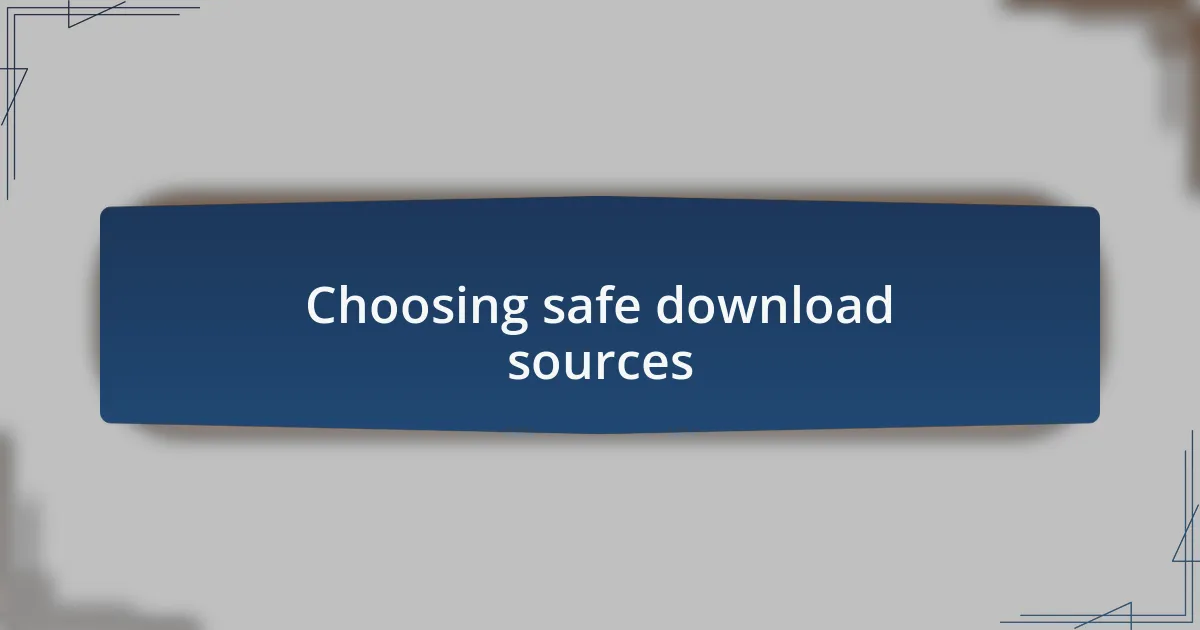
Choosing safe download sources
When I download software, I always stick to the official websites or well-known platforms. For example, I once made the mistake of downloading a game from a sketchy site that ended up infecting my computer with malware. That experience taught me the value of sourcing downloads from trusted places. Ask yourself, do you really want to gamble with unknown websites when your device’s health and security are at stake?
Additionally, I often read user reviews and comments before downloading anything. It’s fascinating how a quick search can reveal potential issues others faced. I remember almost downloading a popular app, but a slew of negative feedback warned me about reliability and security flaws. Those insights saved me a lot of trouble. Why take the risk when a little due diligence can go a long way?
Lastly, I never ignore the importance of security certifications. If a site has a visible HTTPS connection or security badges, I feel more at ease. I make it a habit to check for these indicators first. It’s like seeing a security guard at a store; their presence assures me that I’m in a safe environment. How reassuring is it to feel confident in the downloads I choose?
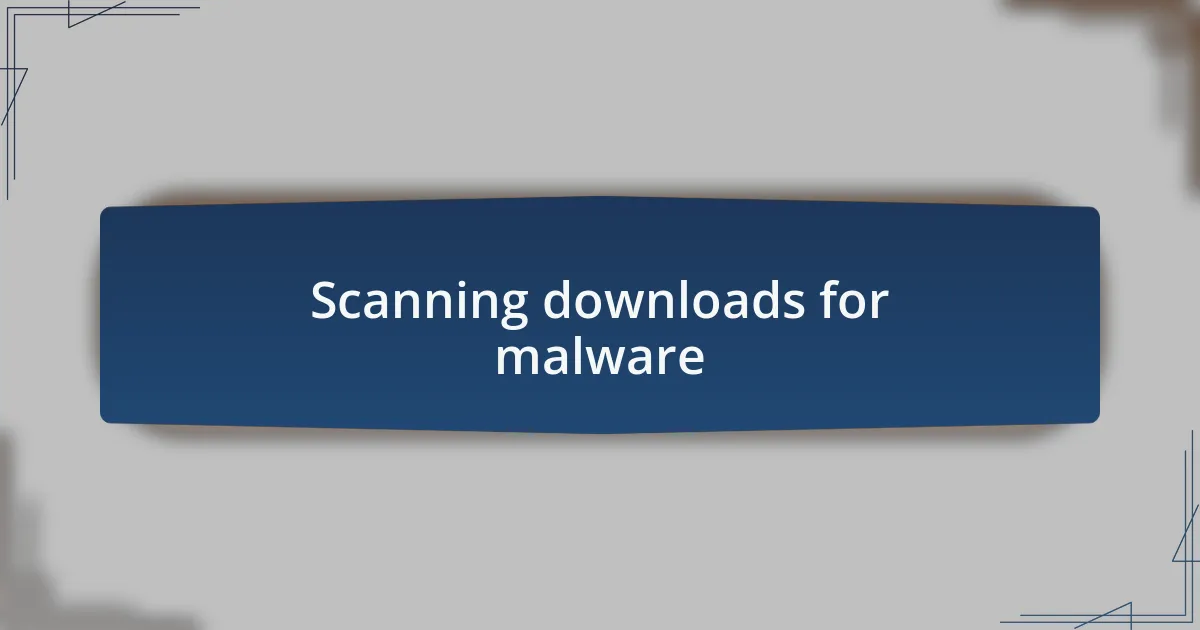
Scanning downloads for malware
When I download files, I always make it a point to scan them for malware before opening. I’ve personally experienced the frustration of allowing an unscanned file onto my system, only to find it loaded with malicious software. Now, I use reliable antivirus tools that automatically scan downloads, which gives me peace of mind. Isn’t it amazing how a simple check can prevent hours of dealing with a virus?
I remember a specific instance when a friend sent me a file that turned out to be infected. It was an innocuous-looking document, but scanning it revealed hidden threats. That sparked a new habit of always running a manual scan on any file shared through email or messaging apps. Why risk your device’s safety for convenience when a few extra seconds can save you from a potential disaster?
Moreover, I’ve found that regular updates to antivirus software are crucial. Outdated versions may miss newer types of malware, which seems a bit scary to me. So now, I also schedule updates to ensure I’m protected against the latest threats. Don’t you agree that being proactive about these scans can make all the difference in maintaining a secure environment on our devices?
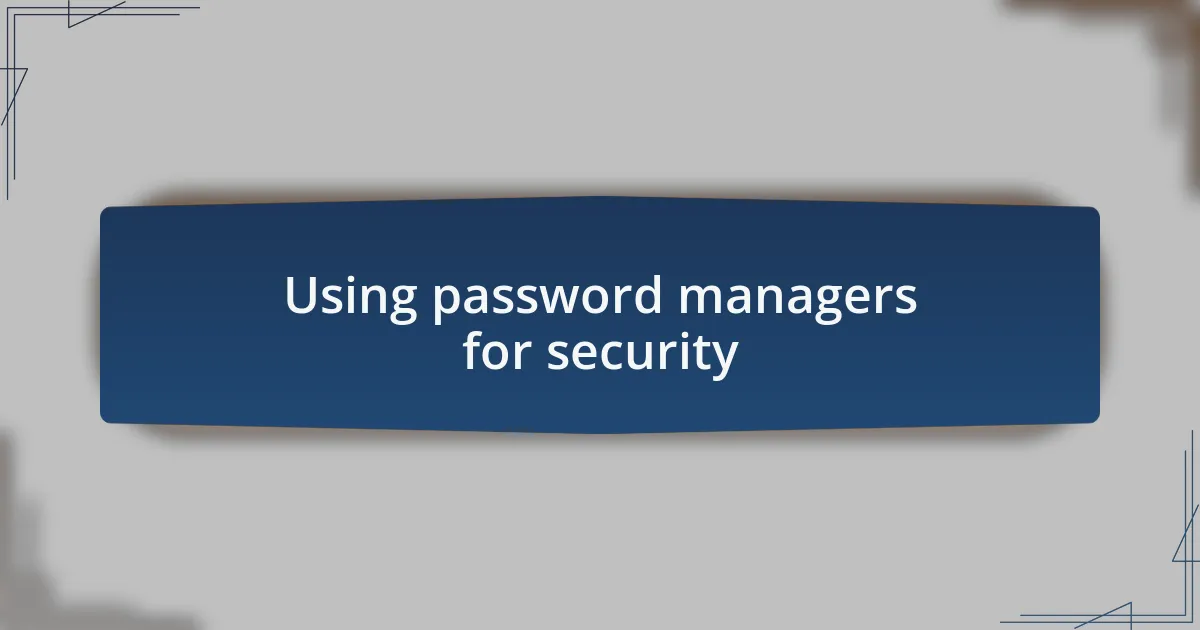
Using password managers for security
Using a password manager has genuinely transformed the way I handle online security. I used to struggle with remembering all my passwords, often resorting to reusing the same ones across multiple sites, which is a big no-no in today’s security landscape. Since I adopted a password manager, I’ve not only simplified my login process but also strengthened my overall security posture by generating complex, unique passwords for each of my accounts. Have you ever thought about the dangers of reusing passwords?
I remember the anxiety I felt after hearing about a major data breach that impacted a service I used. It was a wake-up call for me. I realized that if my passwords were all the same, my accounts were at risk. With a password manager, that fear has significantly diminished. Knowing that my passwords are secure and stored safely, I can focus more on enjoying my online experience rather than worrying about potential hacks.
One feature that I find invaluable is the ability to enable two-factor authentication (2FA) alongside my password manager. This adds an extra layer of security, making it much harder for anyone to gain access to my accounts—even if they somehow get hold of my passwords. Recently, I had to set this up for an important financial application, and it felt like fortifying a digital fortress. Isn’t it comforting to know that even if one aspect of your security is compromised, there’s another layer protecting your sensitive information?
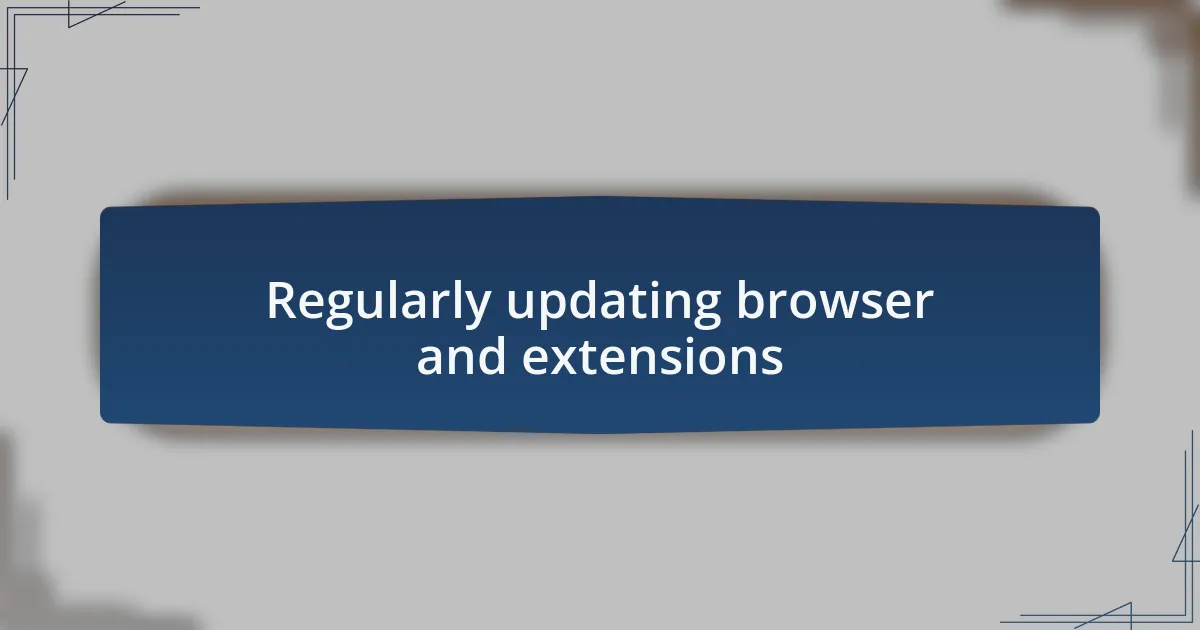
Regularly updating browser and extensions
Staying on top of browser and extension updates is something I prioritize to keep my devices secure. I remember a time when I neglected this task, only to discover that my favorite browser had a critical vulnerability. The relief I felt afterward, when I updated my browser and realized I had dodged a potential disaster, reinforced my commitment to regular updates. Have you ever considered how often such security flaws can be patched with just a simple click?
In my experience, extensions can be particularly vulnerable since they can introduce unwanted risks. There was an instance where an extension I relied on turned out to be outdated and had a serious security flaw. Since then, I’ve made it a habit to review and update my extensions not just for functionality but to ensure my online safety. It’s surprising how easy it is to overlook these updates when we get comfortable with our tools. Are you actively checking for updates, or do you let them pile up?
I find that enabling automatic updates for my browser and extensions takes the pressure off. It’s one less thing to think about, and I can rest easy knowing I’ll receive the latest security patches without having to remember to check manually. Just last week, I received an update notification that included fixes for vulnerabilities I didn’t even know existed. Isn’t it reassuring to know that your browser is actively working to protect you?